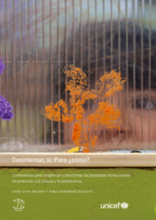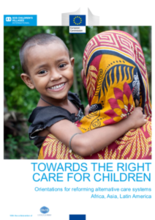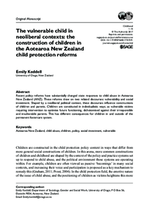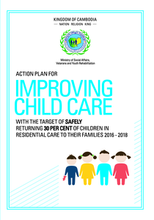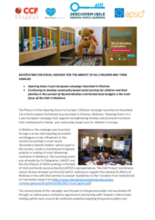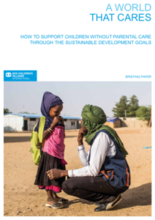Displaying 541 - 550 of 1028
La publicación que se presenta pretende ser un aporte en desarrollando herramientas, metodologías de trabajo, y estrategias para desinternar a niños en distintos momentos vitales. A partir de la experiencia de trabajo y la reflexión sobre su propia práctica, La Barca ordena, sistematiza y pone a disposición de todos los actores del sistema de protección a la infancia los principales aprendizajes de la tarea realizada en los últimos años.
Using national and international law, court observations, and field experiences, this paper argues a case for deinstitutionalization of children in India, by empowering the families, thereby protecting children's right to a family and preventing abuse and exploitation.
The general objective of this study was to conduct a research on the possible issue of institutionalisation in six South and Central American, Asian and African countries in order to strengthen the knowledge of the European Commission on the nature, the extent and scope of institutionalisation and feasibility of de-institutionalisation (alternative care for children).
This paper discusses recent policy reforms have substantially changed state responses to child abuse in Aotearoa New Zealand (ANZ).
This article examines the stories that foster care youth tell to legislatures, courts, policymakers, and the public to influence policy decisions.
This Action Plan for improving child care, with the target of safely returning 30 per cent of children in residential care to their families 2016 - 2018, was developed to support the implementation of the Ministry of Social Affairs, Veterans and Youth Rehabilitation (MoSVY) Work Platform 2014–2018 and the Sub-Decree 119 on the Management of Residential Care Institutions, which was endorsed on 11 September 2015.
This chapter examines stories that foster care youth tell to legislatures, courts, policymakers, and the public to influence policy decisions in the US.
This report from Opening Doors discusses the Opening Doors II pan-European campaign launched in Chisinau.
This briefing describes how the needs of children without parental care can be addressed through five of the SDGs: no poverty (1); quality education (4); decent work and economic growth (8); reduced inequalities (10); and peace, justice and strong institutions (16).
A 2016 survey was commissioned by the Scottish Government to inform the Child Protection Improvement Programme and the Neglect Improvement Pilot. This report presents the findings and analysis from the survey, including achievements and challenges in providing child protection services.

